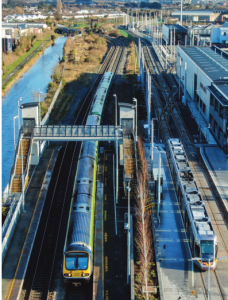Irish  Rail awarded a joint venture comprising Atkins, Typsa and TUC Rail, and supported by RPS, a contract to provide multi-disciplinary consultancy services for the expansion of DART network’s Kildare Line.
Rail awarded a joint venture comprising Atkins, Typsa and TUC Rail, and supported by RPS, a contract to provide multi-disciplinary consultancy services for the expansion of DART network’s Kildare Line.
The joint venture will develop the project from concept through to railway order stage, providing multi-disciplinary services including project management, preliminary design of the 20 km line upgrade and preparation of the railway order.
“The DART Expansion project will ensure the communities we serve – both on the Kildare line and nationally – will gain from better rail services, and a more sustainable future,” Jim Meade, Chief Executive of Irish Rail, said.
The Kildare Line expansion project involves the construction of two additional tracks to the existing two-track line, from Park West station to Heuston and associated structural works to bridges supporting the track. The project also includes electrification and re-signalling works on the from Hazelhatch to Dublin Heuston and through the Phoenix Park Tunnel to Glasnevin junction. Realignment works to accommodate segregation of DART and intercity services will be performed under the project.
DART expansion project will transform the railway services by improving the existing rail network, which radiates from Dublin city centre, the expansion of the network and electrification works. This will provide faster and reliable services and will increase train frequencies and traffic capacity.
The project will crate a full metropolitan area DART network for Dublin, with all of the lines linked and connected. This will transform the rail system in the Greater Dublin Area, delivering new DART services between the City Centre and Drogheda, Maynooth – M3 Parkway and Hazelhatch – Celbridge.
When works will be completed, the number of passengers will increase from 26,000 customers per hour per direction to circa 52,000 passengers per hour per direction by 2027 – 2028, with capacity to increase to a peak of 70,000 passengers per hour per direction thereafter, supported by fleet procurement.
Share on:



